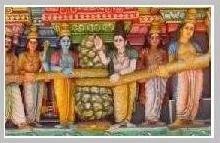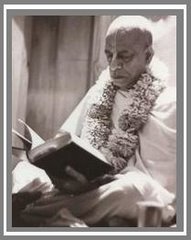 The transcendentalists and the materialists are two distinct classes of men. The transcendentalist gathers knowledge from authoritative scriptures like the Vedas. Vedic literature is received from authoritative sources which are in the line of transcendental disciplic succession. This disciplic succession (paramparā) is also mentioned in the Bhagavad-gītā. Krsna says in the Bhagavad-gītā that hundreds of thousands of years ago the Gītā was spoken to the presiding deity of the sun, who delivered the knowledge to his son Manu, from whom the present generation of man has descended. Manu, in his turn, delivered this transcendental knowledge to his son King Ikṣvāku, who is the forefather of the dynasty in which the Personality of Godhead Śrī Rāma appeared. This long chain of disciplic succession was broken during the advent period of Lord Krsna (five thousand years ago), and for this reason Krsna restated the Bhagavad-gītā to Arjuna, thereby making him the first disciple of this knowledge in this age. The transcendentalist of this age, therefore, is in the disciplic line that starts with Arjuna. Without troubling himself with materialistic research work, the transcendentalist acquires the truths concerning matter and antimatter in the most perfect way (through this disciplic succession) and thereby saves himself much botheration.
The transcendentalists and the materialists are two distinct classes of men. The transcendentalist gathers knowledge from authoritative scriptures like the Vedas. Vedic literature is received from authoritative sources which are in the line of transcendental disciplic succession. This disciplic succession (paramparā) is also mentioned in the Bhagavad-gītā. Krsna says in the Bhagavad-gītā that hundreds of thousands of years ago the Gītā was spoken to the presiding deity of the sun, who delivered the knowledge to his son Manu, from whom the present generation of man has descended. Manu, in his turn, delivered this transcendental knowledge to his son King Ikṣvāku, who is the forefather of the dynasty in which the Personality of Godhead Śrī Rāma appeared. This long chain of disciplic succession was broken during the advent period of Lord Krsna (five thousand years ago), and for this reason Krsna restated the Bhagavad-gītā to Arjuna, thereby making him the first disciple of this knowledge in this age. The transcendentalist of this age, therefore, is in the disciplic line that starts with Arjuna. Without troubling himself with materialistic research work, the transcendentalist acquires the truths concerning matter and antimatter in the most perfect way (through this disciplic succession) and thereby saves himself much botheration. The gross materialists, however, do not believe in the antimaterial worlds of the Personality of Godhead. They are therefore unfortunate creatures, although sometimes very talented, educated and advanced otherwise. They are bewildered by the influence of the material manifestation and are devoid of knowledge of things antimaterial. It is a good sign, therefore, that the materialistic scientists are gradually progressing toward the region of the antimaterial world. It may even be possible for them to make sufficient progress to be able to know the details of this antimaterial world, where the Personality of Godhead resides as the predominating figure and where the living entities live with Him and serve Him. The living entities who serve the Godhead are equal in quality to Him, but at the same time they are predominated as servitors. In the antimaterial world there is no difference between the predominated and the predominator—the relationship is in perfection and without tinge of materialism. ACBSP


















